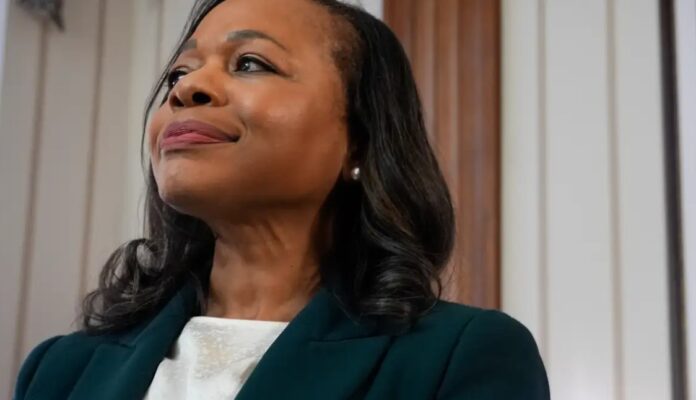Kristen Clarke made history as the first Black woman to lead the U.S. Department of Justice’s Civil Rights Division. She took the job at a challenging time when the country was still dealing with the murder of George Floyd, the COVID-19 pandemic, and rising hate and violence. In an interview with USA TODAY, she shared her pride in the department’s work, especially in holding people accountable for hate crimes and police misconduct.
Even though the department achieved significant wins, Clarke wished she could have done even more, given how busy things were. “This is hard work, and I wish there was more time to do everything,” she said, surrounded by portraits of famous civil rights leaders.
Clarke, who grew up in Brooklyn as the daughter of Jamaican immigrants, said she always wanted to work at the Justice Department. She turned down high-paying jobs to pursue her dream of defending civil rights. She had previously worked in the New York State Attorney General’s office and led the Lawyers’ Committee for Civil Rights Under Law. Her background shaped how she viewed the importance of protecting people’s rights.
Clarke’s time leading the Civil Rights Division included tackling issues like voting rights and police reform. She helped sue states that imposed voting restrictions, and the department worked on police reform, including agreements with troubled police departments in Minneapolis and Louisville. She’s proud of these efforts, though she’s concerned that they could be undone under a new administration.
One of the biggest challenges Clarke faced was the rise in hate crimes. The Justice Department convicted many people involved in such crimes, including those responsible for the killing of Ahmaud Arbery and the mass shooting in Buffalo. While these prosecutions were important, Clarke remains worried about how the country will address hate in the future. Traveling around the country and hearing victims’ stories was emotionally taxing, but it motivated her to keep working for justice.
Clarke also faced personal attacks from some Republican lawmakers, including accusations about her past that were unfairly exaggerated. Despite this, Clarke remained focused on her work, and those who know her praised her for handling the attacks with grace. Her commitment to civil rights and her ability to connect with victims were central to her leadership.
Now, as she prepares to leave her position, Clarke is focused on spending time with her family. Her work at the Justice Department has made a significant impact, but Clarke says it will be hard to match the last four years of fighting for justice. Advocates worry that the progress she made could be rolled back under the next administration, but Clarke remains hopeful that the work will continue.





